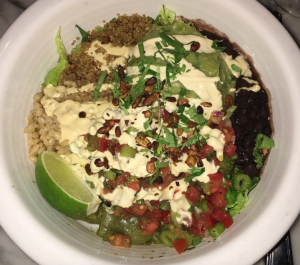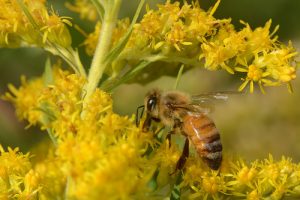Letter to the Editor: Meatless Mondays
Have you ever wondered how what you eat affects the environment? Or if you’re already aware, do you wonder how you can augment your diet to reduce your carbon footprint and help create a better, more sustainable future? Then you’ve come to the right place! Today, I’ll be informing you on the dos and don’ts of diets and easy ways for YOU to make real and necessary change for our environment and your health.
Our meat consumption habits take a serious toll on the environment. According to the Environmental Working Group [EWG], the production, processing and distribution of meat requires huge outlays of pesticides, fertilizer, fuel, feed and water — while releasing greenhouse gases, manure and a range of toxic chemicals into our air and water. A lifecycle analysis conducted by EWG that took into account the production and distribution of 20 common agricultural products found that red meat, such as beef and lamb, is responsible for 10 to 40 times as many greenhouse gas emissions as common vegetables and grains.
Livestock are typically fed corn, soybean meal and other grains which have to first be grown using large amounts of fertilizer, fuel, pesticides, water and land. EWG estimates that growing livestock feed in the U.S. alone requires 167 million pounds of pesticides and 17 billion pounds of nitrogen fertilizer each year. The process generates copious amounts of nitrous oxide, while the output of methane from cattle is estimated to generate some 20 percent of overall U.S. methane emissions.
“If all the grain currently fed to livestock in the United States were consumed directly by people, the number of people who could be fed would be nearly 800 million,” David Pimentel, an Ecology and Evolutionary Biology professor at Cornell University, wrote in The Cornell Chronicle.
A 2009 Greenpeace study found that four-fifths of the deforestation across the Amazon rainforest could be linked to cattle ranching. Furthermore, according to the Natural Resources Defense Council [NRDC], water pollution from factory farms can produce as much sewage waste as a small city. The widespread use of antibiotics to keep livestock healthy on those overcrowded concentrated animal feeding operations [CAFO] has led to the development of antibiotic-resistant strains of bacteria that threaten human health and the environment.
I’m not saying you have to cut all animal products out of your life cold-turkey (unless you want to), but simply by decreasing the amount of meat and increasing the amount of vegetables, fruits, whole-grains and nuts that you eat can do wonders for your health and the health of the environment. Going meatless just one day a week can create vast change that you can be proud of.
Do it for your health: Animal products are high in saturated fat, in contrast to plant-based foods that contain heart-healthy unsaturated fat. A higher consumption of animal products is correlated to a higher risk of cardiovascular disease and a number of studies show that people with diets higher in whole grains and produce, and lower in meat, have a lower risk of heart disease. A US National Library of Medicine study also showed that vegans have significantly lower rates of cancer than meat-eaters. Just skipping the meat one day a week helps you form healthy habits that help you lower your cancer risk.
Worried about protein? There’s no need. The thought that veggies don’t contain protein is quite the myth. In fact, it’s extremely easy to get adequate protein from plant-based sources. Legumes (such as beans and lentils), nuts, tofu and plant based protein powders (such as hemp, pea and rice protein,) are packed with protein and fiber — making them filling and healthy options to include in your vegetarian meals.
Do it for the environment: Lowering your intake of meat makes a notable environmental impact. According to extensive research, if everyone went vegetarian for just one day, the U.S would save 100 billion gallons of water, and we would reduce greenhouse gas emissions by 1.2 million tons of carbon dioxide. According to Environmental Defense, if every American skipped substituted vegetarian food for chicken for one meal a week, the carbon dioxide savings would be equivalent to taking more than half a million cars off of U.S. roads.
Do it for the money: Pound for pound, produce is significantly cheaper than meat. According to the Journal of Hunger & Environmental Nutrition, vegetarians save at least $750 each year in comparison to meat eaters.
Do you like what you’re reading but are unsure on where or how to start? I’ve got you covered. Here is a collection of some of my favorite vegan/vegetarian food bloggers to get you started:
- Oh She Glows
- Minimalist Baker
- The Full Helping *also writes about ethics, eating disorders, emotional eating and learning to love ourselves*
- Vegan Richa
- Pickles & Honey
- Deliciously Ella
- Vegan Yack Attack
- Fork and Beans
- The Vegan Chickpea
- Oh Lady Cakes
- Oh My Veggies
- Cookie and Kate
















fitoru • Feb 5, 2020 at 11:53 pm
Great content and informative read.
More power to articles like this.
Dana • May 17, 2018 at 10:04 am
Great job Audrey! This was such a helpful article with all the facts and links and recipes. While I don’t think I’m capable of going full vegetarian, I definitely want to still help where I can by going vegetarian for one day a week.
Sofia Garreton • May 17, 2018 at 10:03 am
This is amazing! Defiantly inspired and going to check out those blogs.
Gracie • May 15, 2018 at 4:16 pm
Hi Audrey! This article is great and I think I am going to try going vegetarian <3
Alexa Kretchmer • May 15, 2018 at 3:45 pm
Audrey- This article is really thought out and makes me proud to be a vegetarian!